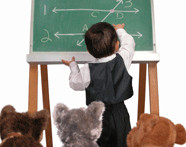The Three C’s: Parenting Beyond ABCs and 123s

When my daughter was born in 2001, the wave of “baby genius” products was in the midst of flooding the market. Baby Genius, Brainy Baby, Baby Einstein, IQ Baby – all of these products, which claimed to develop “great minds,” were flying off the shelves. Toy manufacturers had also begun placing heavy emphasis on the “brain benefits” of their products – language, spatial reasoning, problem-solving, eye-hand coordination. As a parent and child development expert, I couldn’t help but think there was a little too much emphasis on raising a “brainy baby.”
Toy store shelves today continue to be crammed with “smart toys.” And while developmental toys are important for a child’s learning, neuroscientists and child development experts agree that there’s a whole lot more to child development than knowing colours, shapes and numbers…
More than ABCs and 123s, children need connection. They need loving caregivers to spend quality time with them to help them develop a sense of confidence about who they are and an ability to understand and interact effectively with others. The social and emotional skills that develop from positive connection are just as critical in the early years as intellectual development. In fact, research during the last 10 years in the area of emotional intelligence has indicated that social and emotional skills may be more important for success later in life than formal, academic skills.
So, as parents, what can we do to create this positive connection and begin developing these social and emotional skills in our children? I’d like to offer you the approach that I find most useful. I call it the 3C’s – communicate, connect, and celebrate…
Communicate
One of our basic human needs is to feel seen, heard, understood, and appreciated. As parents, it’s important to use positive words with our children, listen to what they have to say, and let them know their thoughts and feelings matter. When we foster positive communication in this way, it builds their self-confidence and their ability to communicate effectively with others.
Connect
When it comes to optimizing development, nothing beats positive face-to-face interaction with a loved one. We make it a habit at our house to give each of our children at least 15-20 minutes of one-on-one alone time every night before they go to bed. During that time we read, talk about the day, and just snuggle together. Creating special one-on-one times like these develops the sense that “I am a person who matters” and lays the groundwork for positive interactions with other people.
Celebrate
Celebrating is an essential ingredient to parenting. When we take delight in and provide unconditional approval for our children for who they are and for their qualities and accomplishments, they internalize several important messages. They learn to see themselves as wonderful and capable, to focus on the positive side of situations, and to recognize the accomplishments of others. We are currently in the process of potty training our 2-year-old, and anytime he successfully uses the potty, he claps for himself and his 4-year-old sister pats him on the back and says, “Good job, buddy!” Now that’s celebrating!
Regardless of the approach you use, in the end, it’s the little things that will make the biggest difference. If we take the time to communicate, connect, and celebrate, our children will have the developmental edge every time.
Ideas for Action
Here are some ideas for putting the 3C’s into action with your family:
- When communicating with your child, practice the “stop, look and listen” technique. *Stop* what you’re doing and *look* your child in the eye to give him your full attention. *Listen* and really hear what your child is saying. You can acknowledge that you are listening by nodding, smiling or raising your eyebrows. This technique will encourage your child to express himself and help him feel that he is heard and understood.
- Schedule special one-on-one time with your child. For babies and toddlers, you can set aside special time for an infant massage or to listen and dance to some fun music. For older children, planning a special outing such as going for a picnic or reading books at the local bookstore is a great way to connect with your child.
- Practice finding oppor-tunities to celebrate your child’s greatness. Catch her doing little things that make a difference and acknowledge her actions, e.g., for sharing a toy or helping someone in need. Celebrate accomplishments such as first steps and attempting to zip a zipper without assistance. Even better, delight in personal characteristics such as kindness, creativity, or curly hair.
Most importantly, be consistent and genuine in your celebrations and have fun!
© DreamKids 2006. All rights reserved. Reprinted with permission. Dr. Kelly Pryde is the president and founder of DreamKids – a company dedicated to celebrating and developing the potential of children and families. A speaker, author, consultant and mother of two, Kelly holds a Ph.D. in Psychology with expertise in child development, learning and behavioral science. Learn more at www.dreamkids.ca.



